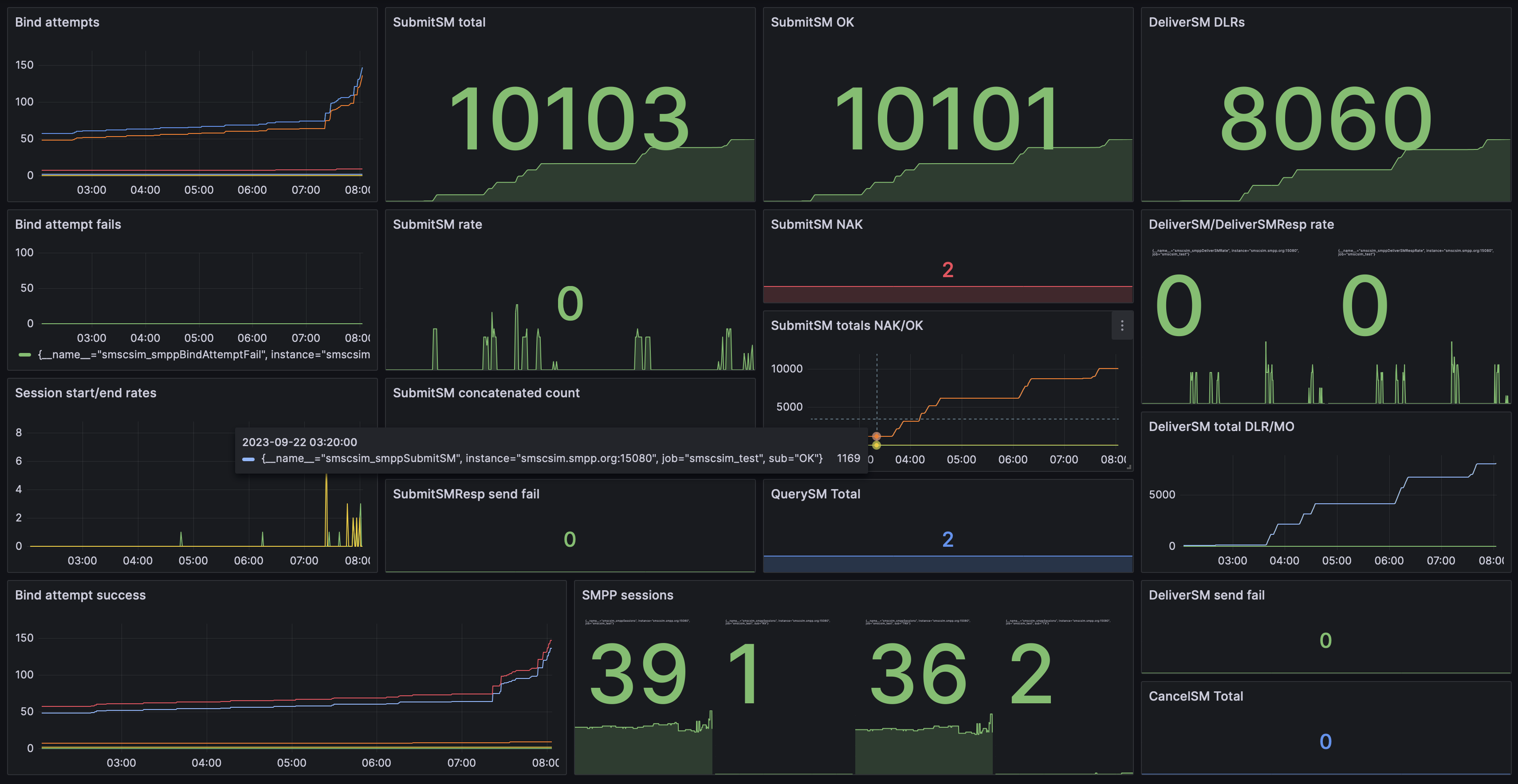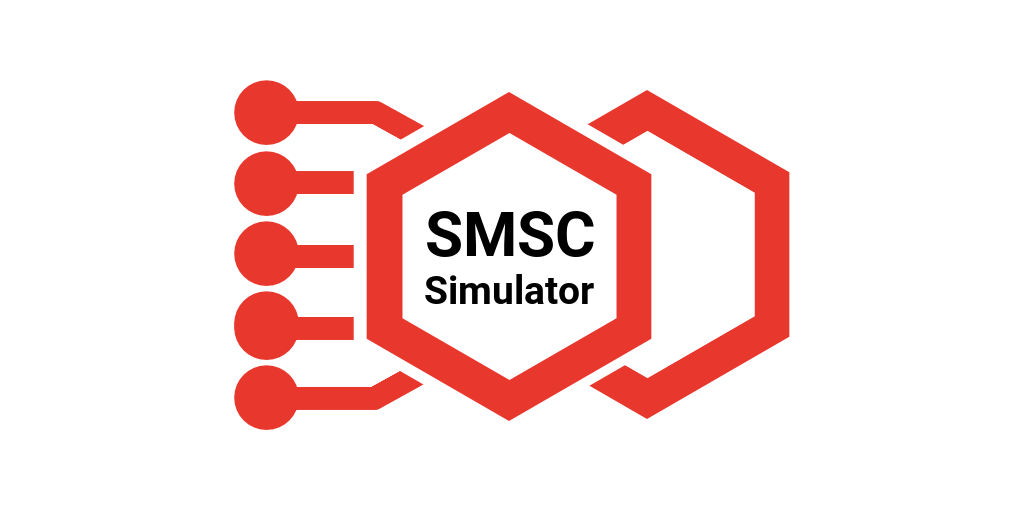Melrose Labs offers SMSC simulators (also known as SMPP server simulators) designed for developing and testing SMS messaging functionalities within applications. These simulators emulate Short Message Service Centres (SMSCs) and SMPP SMS gateways, facilitating the simulation of SMS message delivery. They support SMPP v3.3, v3.4 and v5 over both TLS and non-TLS connections.
Applications transmit SMS messages to simulated mobile devices by submitting them to the SMSC Simulator via SMPP . The simulators emulate message delivery, including the generation of delivery receipts returned to the application. Additionally, simulated Mobile Originated (MO) SMS messages can be submitted and delivered to the application.
SMSC Simulator versions
Shared SMSC Simulator
Shared public simulator for low TPS testing. SMPP credentials valid for 90-days.
Dedicated SMSC Simulator
Simulator for own use and configured based on your requirements. High performance simulator.
AWS Marketplace Dedicated SMSC Simulator
On demand simulators available within your AWS account. High performance simulator.
On-premises SMSC Simulator
High performance, customised simulators with perpetual licenses for running on your servers.
Versions
The SMSC Simulator is available in a number of different versions to suit difference customer needs. SMSC Simulator is part of Melrose Labs SMPP Testing services.
Shared SMSC Simulator
The Shared SMSC Simulator service allows message submissions via an SMPP account at rates up to 100 SMS per second. It returns delivery receipts in a standard format with a “delivered” status for all messages. This shared simulator is non-customisable and does not offer monitoring capabilities. It supports both Mobile Originated (MO) and Mobile Terminated (MT) SMS.
SMPP over TLS support is available for SMS applications to connect securely (SMPP TLS port: 8775).
SMPP Account Details
| Server: | smscsim.melroselabs.com |
| Port: | 2775 (non-TLS), 8775 (TLS) |
| System ID: Password: | Provided when purchased - see pricing |
| System type: | |
Inbound MO SMS Tool
Use the Inbound MO SMS Tool to send MO SMS to your application from the SMSC Simulator to simulate inbound SMS from a mobile.
Utilise the provided SMPP account details in your application or with our SMPP clients to connect to the SMSC simulators and submit messages at rates up to 100 SMS per second. Please note that SMPP credentials must be purchased to access the SMSC Simulator service.
Credentials are valid for 90-days from issue.
Dedicated SMSC Simulator
Dedicated SMSC Simulator instances are available for clients requiring advanced testing capabilities beyond the shared service. These instances support up to 8,000 SMS per second, accommodate up to 250 SMPP binds per IP, and allow an unlimited number of SMPP credentials. They also offer SMPP v5 flow control, congestion avoidance, and configurable delivery receipts (status, latency, format). The specific capabilities and configurations can be tailored to meet your requirements.
SMPP over TLS, performance monitoring using Prometheus/Grafana, dedicated capacity and CDRs are supported. Instances are available at our London, Frankfurt, Stockholm, Cape Town, Hong Kong, Singapore, Sydney, North Virginia, Ohio and São Paulo locations.

Dedicated SMSC Simulator dashboard in Prometheus/Grafana
Available in one month blocks at GBP 250 per month (no TLS) or GBP 300 per month (SMPP over TLS).
Please contact us if you require a Dedicated SMSC Simulator instance.
AWS Marketplace Dedicated SMSC Simulator
AWS Marketplace Dedicated SMSC Simulator instances can be created for those with testing needs beyond the shared service and need to test within their own cloud environment. AWS Marketplace Dedicated SMSC Simulator instances support up to 10,000 SMS/sec, up to 250 SMPP binds per IP, and unlimited number of SMPP credentials.
Performance monitoring is possible using Prometheus/Grafana. Instances are available across all AWS regions.
AWS MarketplaceOn-premises SMSC Simulator
The On-premises SMSC Simulator is available for those who need to perform frequent testing or are unable to use cloud testing services. We offer On-premises SMSC Simulator software with support for 8,000 SMS/sec, up to 50 SMPP binds, unlimited number of SMPP credentials, SMPP v5 flow control and congestion avoidance, CDRs, and configurable DLRs (status, latency, format). The capabilities and configuration provided are dependent on your requirements.
As with the cloud-based Dedicated SMSC Simulator, performance monitoring using Prometheus/Grafana is supported (see above Grafana dashboard).
Melrose Labs will supply software binaries and technical support to fulfil your required configuration. You provide the host on which the binaries are installed. When ordering, select a RedHat (suitable for Centos, SuSE Linux, etc) or Debian (suitable for Ubuntu, Mint, etc) build.
Please contact us if you require an On-premises SMSC Simulator.
SMSC Simulator Pricing and Comparison
| Shared SMSC Simulator | Dedicated SMSC Simulator | Dedicated SMSC Simulator (AWS Marketplace) |
On-premises SMSC Simulator software license | |
|---|---|---|---|---|
| Price | 5 credentials @ USD 225 | GBP 250/month - non-TLS | USD 0.271/hour | USD 3,300 (perpetual; 5 hosts; 5,000 TPS) |
| 1 credential @ USD 75 | GBP 300/month - TLS | USD 1,000 (perpetual; 5 hosts; 1,000 TPS) | ||
| Credential validity | 90-days | Indefinite | Indefinite | Indefinite |
| Maximum SMS rate (TPS) | 100 SMS/sec | 8,000 SMS/sec | 10,000 SMS/sec | 1,000 SMS/sec; 5,000+ SMS/sec |
| Maximum binds | 25 per IP | 250 per IP | 250 per IP | 250 per IP |
| Shared capacity | ||||
| SMPP over TLS | AWS NLB additional cost | |||
| Dedicated capacity | ||||
| CDRs | ||||
| Customisation | ||||
| Prometheus integration | ||||
| Support | Year 1: included Year 2+: USD 225/year |
|||
| Contact us | AWS Marketplace | Contact us |
Service snapshot
- Test SMS applications and infrastructure without SMS cost
- SMPP v3.3, v3.4 and v5
- MT and MO SMS testing (A2P and P2A)
- SMPP over TCP and SMPP over TLS 1.1+ supported
- SMPP test tool



